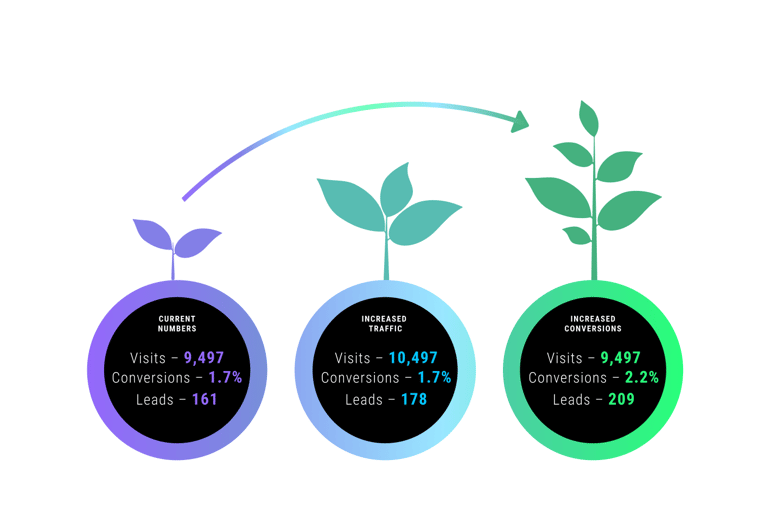
By Chantel Hall, Marketing Content Specialist
Most marketing teams are familiar with the pressure to do more within the limits of their budget, with attracting and qualifying more leads usually at the top of the list. But a focus on stuffing as many leads into your pipelines as possible isn’t likely to have a positive impact on your bottom line. Cost per lead (CPL) and cost per acquisition (CPA) can be pretty high in B2B marketing — a business services SaaS lead can range from $585 for a small business up to $7,247 for an enterprise lead.1 Generating more leads isn’t always the answer for salespeople struggling to meet their monthly goals.
However, marketers can set salespeople up for success, boost conversion rates, and lower CPL and CPA by focusing on lead quality instead of quantity. In this blog post, we’ll demonstrate how improving lead quality can positively impact lead acquisition and conversion costs.
Increasing traffic to your website is a tempting metric to focus on when salespeople are pushing for more leads, but in most instances, it’s a vanity metric that won’t indicate success. B2B businesses usually have a relatively small target audience of potential buyers who are both qualified and interested, so at a certain point an unending effort to increase website traffic will begin attracting more low-quality, unqualified leads.
Website traffic also has to increase significantly to make a meaningful difference in the number of leads salespeople have to work with. For example, let’s say you’re a B2B tech company with an industry average conversion rate of 1.7%, and this month you got 9,497 visitors to your website.2 This gives you 161 leads total to work with. Even if you increased website visits by 1,000 every month, it would only result in 178 leads — an increase of 17 leads — to work with. Is the marketing spend required to get those 17 leads worth it?
Relying on increasing traffic to your website has a limited ability to increase revenue and decrease CPL. As we’ll discuss in the next section, focusing on the quality of your website visitors and leads will do more to reduce costs and make better use of your marketing and sales teams’ efforts.
B2B companies have long, complex sales cycles; 77% of B2B buyers state that their last purchase was very difficult or complex, and the typical buying group for a complex B2B solution involves six to 10 decision makers, each armed with information they gathered independently and have to evaluate all of the information and make a decision as a group.3 To attract more leads that will be interested and motivated enough to go through the entire process, you need to focus on attracting leads that fit your buyer profiles to increase your conversion rate.
Let’s go back to the example we gave you in the last section and see how conversion rates affect lead generation outcomes. With those 9,497 visits to your website every month, if you increased your conversion rate by even .5% — up to 2.2% — you would generate 48 more leads every month. When you are focused on attracting leads that match your ideal customer profiles (ICPs), your conversion rate will improve and your salespeople will have more qualified leads to work with.

Focusing on lead quality also allows you to take better advantage of the marketing work you’re already doing. It often just requires fine-tuning your messaging and points of conversion. Instead of launching new campaigns and incorporating new channels to generate more and more leads, you can tighten your strategy to focus on the channels you know your buyers use and generate content tailored to their pain points and aspirations.
In the next section, we’ll cover a few ways marketers can begin generating higher-quality leads and improving conversion rates.
Marketing teams can address lead quality in a few different ways, and it’s essential to start this process with some input from the sales team. They have valuable data and insight into your target audience and buyers and what converts those leads to customers. Once you have your ICPs defined and know who your target audience is:
Most importantly, continue to refine and test your process. If a campaign isn’t performing well, you don’t need to scrap it and start over — tweak the content offer, refine the copy, or edit down the fields on your form, then run the new version for a week and see how it performs.
Your efforts to attract better quality leads and improve your conversion rates will not be a set-it-and-forget-it process. It will require continual testing and improvement, collaboration with your sales counterparts, and a dedication to data-driven decision-making.
Sources
1First Page Sage, Average CAC for SaaS Businesses, by Industry & Customer Type, November 19, 2020
2Ruler Analytics, Average Conversion Rate by Industry and Marketing Source, March 30th, 2021
3Gartner, New B2B Buying Journey & its Implication for Sales
DataBox, 11 Ways to Improve Lead Quality According to 40 Marketing & Sales Experts, January 26, 2022
by Jonathan Franchell, CEO of Ironpaper - For more tips and hacks: Need to remove a new line after h1 tags? Both web designers and SEO practitioners need to employ headline tags: H1, H2, H3 in several ways to improve web page structure and tag...

The Crowded Arena of the IT Marketplace Updated December 2024 The Information Technology (IT) landscape is experiencing rapid growth and intensifying competition. IT spending is projected to reach nearly 5.1 trillion U.S. dollars in 2024, a...

Updated December, 2024 The field of digital marketing is evolving rapidly in response to new technology and changing buyer expectations. To help career-minded marketers, we’ve rounded up the top 10 skills needed to succeed in the field. These are...

The marketing industry is transforming significantly due to generative AI and increasing market complexity. Gartner's prediction of a 25% decline in traditional search traffic suggests that the era of search engines is dying. AI tools, particularly...
